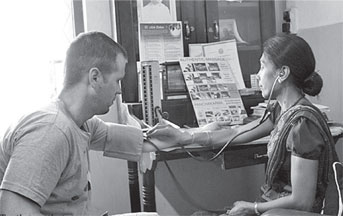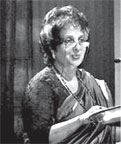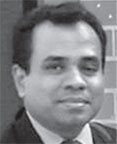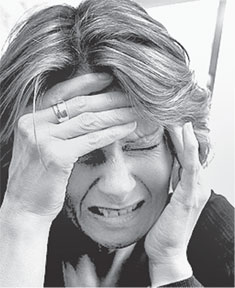|

Women at the forefront of Sri Lanka’s health success
By Nilma Dole
In Sri Lanka, the majority women have been respected and given equal
opportunities as men be it education, employment or even equal family
status. Celebrating International Women's Day on March 8, Sri Lanka's
medical industry took the chance to honour women health professionals
who have been at the forefront of not only initiating, developing and
sustaining Sri Lanka's health industry but also setting an example by
showing that if men can do it, so can women. Moreover, they have
addressed women's issues such as Gender-based Violence and Sexual
Harassment which has paved the way for stringent action against
wrong-doers and more health evidence to bring criminals to justice.
Being women, it has been instrumental in offering support for women of
lesser classes in the social strata.
|
Distinguished
women-health professionals
1. Dr. Selvi Perera
2. Prof. Dulitha Fernando
3. Dr. Malani De Silva
4. Prof. Leela De A. Karunarathne
5. Dr. Maya Atapattu
6. Dr. Nalini Withana
7. Dr. C. D. Jayaweera Bandara
8. Dr. Stella De Silva
9. Prof. Priyani Soysa
10. Prof. Anoja Fernando
11. Prof. Gita Fernando
12. Dr. Suriyakanthi Amarasekara
13. Prof. Lalitha Mendis
14. Dr. P. Amarasinghe
15. Dr. U. Weerasinghe
Courtesy
Sri Lanka Medical
Association |
 |
|
Treating a patient |
In recognising women health professionals, the Sri Lanka Medical
Association (SLMA) together with Mega Lifesciences held a special event
titled, ‘Outstanding Health Professional awards 2012’ to honour those
who have made a massive impact on strengthening the medical industry
with their womanly worth.
Dr. Vajira Dissanayake, President of the SLMA said, “Today we
recognise women who have uplifted the Sri Lanka's medical standards.
They have gone where no woman has gone before.” He said that by
honouring these women health professionals only makes them and other
women reach greater heights.
He said, “The women professionals we honour today have been founders
of the Medical Colleges and have also contributed to Sri Lankan Medical
Associations including the SLMA.”
The chief guest was Prof. Lalitha Mendis, a notable woman health
professional who has been the epitome of modern womanhood to inspire
generations after to tackle women's health issues and focus on women's
medical health.
She said that unlike our Asian counterparts, ancient Sri Lanka had a
society where women were treated with respect. “In the 18th century,
Robert Knox who visited Sri Lanka records that women in Sri Lanka got
more attention and respect than their Asian counterparts, that there was
no ill-treatment of women as slaves but as equal companions”, she said.
Even though civilisations such as ancient Egypt gave their women a
higher status in society, others such as India, Greece and even China
held little or no respect for women.
“In the modern era, Sri Lanka has still a positive story where we had
the world's first woman prime minister and our first president a few
decades after we obtained independence,” said the Professor.
She said in her presentation, that about 50 percent of the women in
Sri Lanka compromise approximately 50 percent of admissions to most
faculties in Sri Lankan universities. “Prof Priyani Soysa was the first
professor in 1966, Daphne Attygalle was the first Dean of a university
and Savithri Gunasekera was the Sri Lanka's first university Vice
Chancellor.
“Due to high literacy rates of women, the percentage soared from a
mere 8.5 percent in 1901 to 53 percent in 1953.
It was in a census in 2007 when it was discovered that literacy rates
among female youth was at 98.6 percent while men stood at a percentage
less than that at 97.3,” she said.
By highlighting literacy rates among women, Prof. Mendis made a
strong point that high literacy and good education contributed to good
health decisions and a well-rounded knowledge of medical aspects.
 |
 |
| Prof. Lalitha Mendis |
Dr. Vajira Dissanayake |
“The educating of women has helped drive a good medical health sector
where timely health advice, prevention and treatment is sought in
addition to prompt consultation and after-treatment attention,” she
said.
In addition, the value of immunisation, maternal health and have led
to success in low maternal mortality rates and low infant mortality
rates as well as effective methods of family planning.
“Given the responsibility, women can be good budget planners finding
the right food to provide for their family and knowing what is the best
choice,” she said.
While this paints a good picture of women equality in Sri Lanka in
contrast to the rest of Asia, there are challenges that are also
present.
“However, there are still women-related issues rampant in the world
today.
In Sri Lanka, we have had to tackle domestic violence and sexual
harassment including those trapped in unhappy marriages where their
husbands are alcoholics or are on drugs.
We also have the issue of war widows and those traumatised by war and
violence,” she said. Dowry killings, honour killings and infant female
genocide still takes place in societies around the world.
A book was also launched by the Women's Health Committee of the SLMA
on their collective findings on gender-based violence. The publication
reveals statistics and figures that account for issues in women's
violence and also how to address such problems. According to sources,
although violence is generally perceived as physical harm being
committed on a person, the scope of defining the issue and its
implications as stated in the UN Declaration for the Elimination of
Violence against Women.
It covers aspects such as physical, sexual, psychological and goes on
to elaborate forms of violence in coercion and lack of personal freedom
and mobility.
Many perspectives pertaining to medical aspects with regard to
gender-based violence has been a significant contribution to
understanding more about this problem by research done by the SLMA.
The problem is that women think that it is ‘karma’ or bad luck to be
married to an abusive husband or have had their marriages arranged to
husbands without knowing if they are abusers.
In Sri Lankan society, it seems as though elderly women think that it
is alright for a husband to ‘control’ his wife, something like a scene
out of Shakespeare's ‘Taming of the Shrew'.
There are counselling centres and other ways to deal with such a
problem but how can it be done if even the police tell women that they
should solve their own problems at home?
The present issues faced by women should be dealt with with stronger
law enforcement and better understanding of women's equality instead of
shunning it aside and as women health professionals make their mark in
Sri Lanka's health industry, they are setting a good example of women's
equality.
“Facing the change from a single role homemaker to dual or even
multiple roles of supplementary breadwinner and professional can be a
formidable task,” she said.
The greatest thing is that, unlike our Asian counterparts, the birth
of a girl child is celebrated and they are given equal opportunities of
education where they really balance a family life, career and fit
comfortably into the role of loving wife and caring mother.
She said, “Much more than honouring women professionals, I hope that
there will be an award for the most creative housewife as they deserve
to be recognised too!”
New advance in body ‘chemical switch’ study has implications for
strokes, heart attacks
‘We have the first realistic insight into how a switch linked to
blood-clotting, and therefore connected to strokes and heart-attacks, is
operated’ - lead researcher Richard Evans.
 Scientists
investigating a ‘biochemical switch’ linked to strokes and heart disease
claim to have made an advance in understanding how it is ‘turned on'. Scientists
investigating a ‘biochemical switch’ linked to strokes and heart disease
claim to have made an advance in understanding how it is ‘turned on'.
The breakthrough is in the prestigious science journal Proceedings of
the National Academy of Sciences. The work was led by a team at the
University of Leicester, working in collaboration with Cardiff
University, to investigate the ‘biochemical switch’ identified as the
P2X1 receptor. It was funded by the Wellcome Trust and the British Heart
Foundation. Lead researcher Professor Richard Evans, of the University
of Leicester Department of Cell Physiology Pharmacology, said: “P2X1
receptors are protein molecules expressed on blood platelets which are
cells involved in blood clotting. Drugs that block these receptors have
the potential to reduce “dangerous” blood clotting that leads to strokes
and heart attacks
“Our research has looked at how the P2X1 receptor is “turned on”. By
biochemical studies and purifying the P2X1 receptor and using an
electron microscope we have ‘visualised’ the receptor and detected
changes in its shape when it is activated.
“The P2X1 receptor is made of three identical parts and we have shown
that activation leads to these twisting against each-other. We found
that if we chemically locked the receptor to stop this twisting, then
the P2X1 receptor could not be fully activated.
“This is important as it gives the first realistic insight into how
these novel receptors are turned on. “This work will help to develop
drugs that can stop the P2X1 receptor being “turned on” and would be
useful to prevent stroke and heart attack.
- MNT
Personality change, the key to improving well-being
People's personalities can change considerably over time, say
scientists, suggesting that leopards really can change their spots.
Psychologists from the University of Manchester and London School of
Economics and Political Science (LSE) also showed that small positive
personality changes may lead to greater increases in happiness than
earning more money, marrying, or gaining employment.
The study, published in the journal Social Indicators Research,
should be of interest to British Prime Minister David Cameron, who has
suggested that a measure of the nation's ‘happiness’ was a better guide
to how the country was performing than Gross Domestic Product (GDP)
alone.
 Lead
author Dr Chris Boyce, from the University of Manchester's School of
Psychological Sciences said: “We found that our personalities can and do
change over time - something that was considered improbable until now –
and that these personality changes are strongly related to changes in
our well-being. Lead
author Dr Chris Boyce, from the University of Manchester's School of
Psychological Sciences said: “We found that our personalities can and do
change over time - something that was considered improbable until now –
and that these personality changes are strongly related to changes in
our well-being.
“Compared with external factors, such as a pay rise, getting married
or finding employment, personality change is just as likely and
contributes much more to improvements in our personal well-being.”
Previous studies have shown that personality accounts for up to 35pc
of individual differences in life satisfaction, compared to just 4pc for
income, 4pc for employment status and between 1pc and 4pc for marital
status.
However, because it was believed our personalities were fixed,
policies to improve well-being have focused on these lower impacting
external factors.
Dr Boyce said: “Our research suggests that governments could measure
‘national personality'; for example, whether the population is becoming
more extroverted, conscientious, open to experience, and agreeable, and
how this links to national events.
“Fostering the conditions where personality growth occurs - such as
through positive schooling, communities, and parenting - may be a more
effective way of improving national well-being than GDP growth.”
Dr Boyce, with Manchester colleague Dr Alex Wood and the LSE's Dr
Nick Powdthavee, used a large data set of 7,500 individuals from
Australia who had answered questions on their life satisfaction and
personality at two time points four years apart.
Personality was measured using a well-validated personality
questionnaire assessing five broad dimensions which cover the breadth of
a person's personality: openness-to-experiences, conscientiousness,
extroversion, agreeableness and neuroticism.
The researchers then looked at the extent to which personality
changed and how these changes related to life satisfaction in comparison
to external factors, such as changes to income, changes to employment
and changes to marital status.
They found that personality changes at least as much as these
external factors and predicted about twice as much of changes to life
satisfaction over the study period.
Dr Boyce added: “The focus of many well-being studies in economics is
on how changes to our circumstances, such as a higher income, getting
married or a different job might influence our well-being.
The influence of our personality is often ignored in these types of
studies in the belief that our personality can't or doesn't change.
We show that personality can and does change and, not only is it more
likely to change than an income increase, it contributes much more to
changes in our well-being.
“Our research suggests that by focusing on who we are and how we
relate to the world around us has the potential to unlock vast
improvements in our well-being.
His findings have implications for well-being policy – something the
Prime Minister has talked about in the past - and how best to help
individuals and nations improve their outlook on life.
sciencenews
Using music to evoke positive emotions
Music can evoke positive emotions, which in turn can lower the
listener's stress levels.
 Everyday
music listening is therefore a simple and effective way to enhance
well-being and health, according to a new doctoral thesis in psychology
from the University of Gothenburg. Everyday
music listening is therefore a simple and effective way to enhance
well-being and health, according to a new doctoral thesis in psychology
from the University of Gothenburg.
The thesis is based partly on a survey study involving 207
individuals, partly on an intervention study where an experiment group
consisting of 21 persons listened to self-chosen music for 30 minutes
per day for two weeks while an equally sized control group got to relax
without music.
The results of the studies show that positive emotions were
experienced both more often and more intensively in connection with
music listening.
The experiment group did also perceive less stress and had lower
levels of the stress hormone cortisol.
The more the participants in the survey study liked the music, the
less stress they experienced.
‘But it should be pointed out that when studying emotional responses
to music it is important to remember that all people do not respond in
the exact same way to a piece of music and that one individual can
respond differently to the same piece of music at different times,
depending on both individual and situational factors. To get the
positive effects of music, you have to listen to music that you like,’
says the author of the thesis Marie Helsing.
-APP
|

